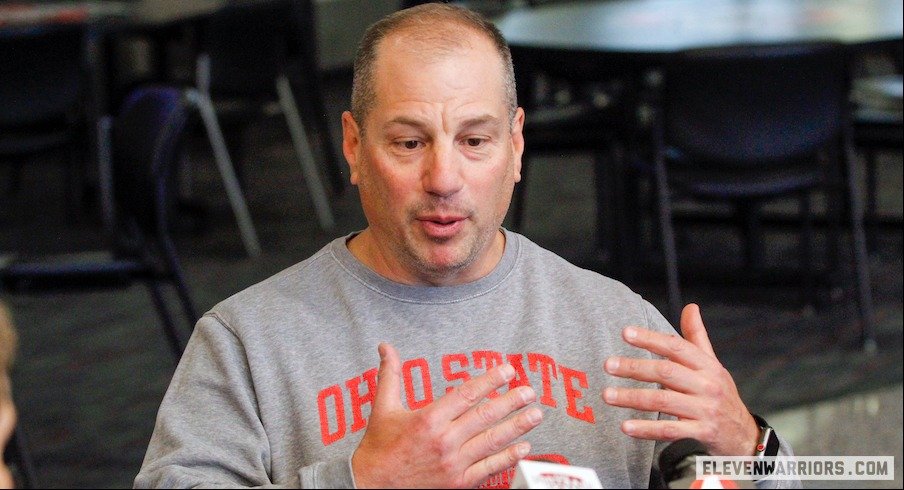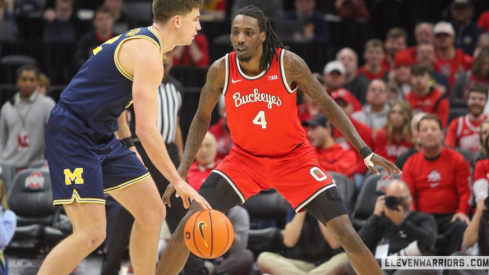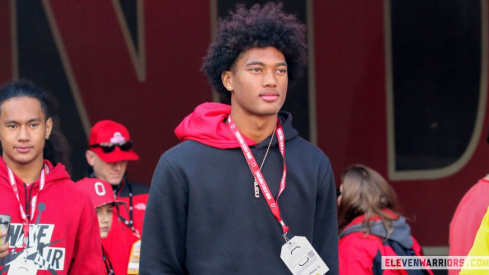Mickey Marotti experienced his first loss in the Ohio State-Michigan rivalry last November, and it came in a fashion that no strength and conditioning coach would want to see.
After winning each of their first eight games against Michigan since Marotti’s arrival in Columbus in 2012, the Buckeyes were manhandled at the line of scrimmage in their 42-27 loss to the Wolverines last year in Ann Arbor. The maize and blue ran for a whopping 297 yards and six touchdowns while holding Ohio State to just 64 yards and one touchdown on the ground as Michigan dominated the game in the trenches.
Marotti says he – and everyone inside the Woody Hayes Athletic Center – had to go back to the drawing board after that game as they look to ensure it won’t happen again.
“I think everybody had to look in the mirror. Everybody,” Marotti said Friday while meeting with the media for the first time since that loss. “Everybody in this building from players, coaches, athletic trainers, nutritionists, equipment managers, everything and just kind of go back and look at what happened, why. And then turn over every stone and try to come up with a plan.”
From a technical standpoint, the Michigan loss – and Ohio State coming up short of achieving all of its major goals last season – didn’t necessarily lead to any changes in how the strength and conditioning program operates. Marotti says he and his staff are always looking to innovate how they do things, specifically through a sports science initiative that Ohio State’s athletic department has been working on with the university’s Human Performance Collaborative, so their strength and conditioning program would have continued to evolve this offseason no matter how last season went.
While some critics questioned after the Michigan loss if Marotti’s methods for developing players had become outdated, Marotti says Ohio State’s sports performance program has evolved in many ways since he started with the Buckeyes 10 years ago.
“I think the principles are lasting. You're gonna work hard, you’re gonna show up on time, you're gonna be a great teammate, you're going to be a leader, you’re gonna do all those things. But I think with the sports science initiative that we've been working on the last five, six years, it's evolving, it's always evolving,” Marotti said. “Just like offenses and defenses, always evolving, always changing, always developing, always growing. And that's been good. There’s a lot of assessment going on. Obviously, looking at the research and talking to the people that we’re talking to try to make our program better as we move forward.
“I don’t think you have to add new things to add new things. I think you have to add things that have been proven scientifically.”
What Marotti thinks the Michigan loss has done, though, is “it’s gotten everybody’s attention,” inspiring everyone to work harder this offseason as the Buckeyes look to get back to winning The Game and competing for championships this fall.
“I don't want to say it’s perked everybody up. But I think if the volume was already turned up, you're looking for a power button that gets it to 12 or break it or smash it and get another one with more power,” Marotti said. “Obviously we know how important that game is. All those goals. And if you don't reach those goals, you got to figure out why.”
“I think everybody had to look in the mirror. Everybody. Everybody in this building from players, coaches, athletic trainers, nutritionists, equipment managers, everything.”– Mickey Marotti on responding to the Michigan loss
When Marotti reflected back on what went wrong last year, he identified the same problem Ryan Day did: A lack of leadership. Marotti believes that stemmed in part from what happened in 2020, when the Buckeyes were away from campus for three full months and then had to adhere to strict healthy and safety protocols when they returned due to the COVID-19 pandemic.
“You couldn't have any team workouts together,” Marotti said. “Basically, they couldn't even get a breakdown after a training session or workout. So you lost a lot of that togetherness, relationships stuff. It was just hard. It was hard to have everybody separate. You had a weight room set up in the weight room that was spread out, only eight players. And you had another weight room setup in the indoor with eight players. So sometimes, I didn't see a guy all day because I was outside or inside or vice versa. So it was hard. It was really hard. We tried to make the best of it, like everybody else, but I think we lost a lot.”
That also impacted the players’ physical development, as well.
“From a physiological standpoint and a safety standpoint, you have to assume for those three months that they were home, they did nothing. So the progressions were a lot slower,” Marotti said. “By the time you get them to the point where they would have been, camp started. Oh no, not here, camp didn’t start. Oh, it did, then it didn’t. So I think that affected us in every way.”
Now four months into the 2022 offseason, Marotti believes the Buckeyes are back to where they’re supposed to be. They placed a big emphasis on building leadership during winter workouts by selecting a 24-player leadership committee and assigning each of those players to lead one of 12 offseason workout groups, which both Day and Marotti believe helped create accountability throughout the team.
“This is probably the best we've done in an offseason of forging leadership,” Day said in March.
Marotti says the Buckeyes “made really good progress over the winter,” and he thinks that many of the players who were inexperienced going into last season – another side effect of 2020, when Ohio State played only eight games – are now ready to be the leaders the Buckeyes need to be successful this season.
“Sometimes, I think you have to go through struggle to come out of it stronger,” Marotti said. “And some of our players last year played for the first time, and there were struggles. And when you come out of it on the other side, now they kind of know what to expect. And some guys, just because they don't play, they feel like they can't be out in front of a group because they haven't stepped on the field. So you had a little bit of that. And then I think because of that, guys stepped up and really have a different mindset, a completely different mindset.”


